|
|
|
Sort Order |
|
|
|
Items / Page
|
|
|
|
|
|
|
| Srl | Item |
| 1 |
ID:
141485
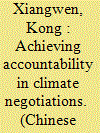

|
|
|
|
|
| Summary/Abstract |
As negotiations for the post-2020 agreement on climate change are underway and expected to be concluded by the end of 2015, the call for ensuring accountability with respect to the implementation of the agreement is attracting increased attention. Hence, one need to have a clear understanding of the meaning of the term “accountability”, particularly as it is used in relation to climate change. Accountability, a term used frequently in politics, is rather new in international law. This paper examines the history of achieving accountability in climate change negotiations, and examines that history under three headings, namely, (1) accountability for historical emissions of developed countries, (2) accountability under the Convention and (3) accountability under the Kyoto Protocol. Through a reflection on past accountability practices, this paper intends to establish that two different modes for achieving accountability have emerged: (1) international legal accountability, and (2) international political accountability. These may well provide useful guides to those involved in crafting the post-2020 agreement. As past practice in climate negotiation has shown, achieving accountability has been fraught with difficulties due to its implications for sanctions or political pressures on a sovereign State. These same concerns would persist in the discussion of the accountability regime for the post-2020 agreement.
|
|
|
|
|
|
|
|
|
|
|
|
|
|
|
|
| 2 |
ID:
141482


|
|
|
|
|
| Summary/Abstract |
There is an apprehension in the democratic world about the possible impact of the economic rise of China on the UN human rights agenda. Although Communist China has embraced capitalism by liberalising its economy, by joining the WTO and by recognising private entrepreneurship and the right to private property, it has not been an enthusiastic partner when it comes to promoting and protecting human rights. China has supported the idea of so-called “Asian values”, or cultural and political relativism, as well as promoting the idea of a “China Model of Democracy”, which seeks to support economic growth at the expense of civil and political rights. This article examines China's approach to human rights both within and outside of the UN and whether China's rise as a major economic power poses a threat or offers an opportunity to the international human rights system led by the UN. In doing so, it considers how China is changing in terms of its approach to the rule of law, democracy and human rights and why it needs to become a willing and enthusiastic player within the UN system to promote and protect human rights. The author concludes that China will not pose a threat to the UN human rights agenda. One way or the other, the only way forward for China is to embrace the rule of law, and this will in turn entail respect for human rights. Thus, there is an opportunity for the UN to introduce human rights law and jurisprudence developed by the UN treaty bodies to the Chinese legal and constitutional system.
|
|
|
|
|
|
|
|
|
|
|
|
|
|
|
|
| 3 |
ID:
141487
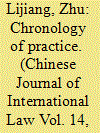

|
|
|
|
|
| Summary/Abstract |
This survey covers materials reflecting Chinese practice in 2014 relating to: fundamental principles of international law (five principles of peaceful coexistence); sources of international law (identification of customary international law); China's territorial integrity (Tibet; Diaoyu Island and its affiliated islands; Xisha Islands; Nansha Islands; China-India Memorandum of Understanding on Hydrological Data Sharing on the Yaluzangbu River; China-Pakistan agreement on border ports and their management system); international law of the sea (contracts with International Seabed Authority); outer space law (updated Text of Draft Treaty on Prevention of the Placement of Weapons in Outer Space and of the Threat or Use of Force Against Outer Space Objects; non-legally binding United Nations instruments on outer space); international cyperspace law (international law in cyberspace); aliens (expulsion of aliens); international human rights law (general positions on human rights; Human Rights Council; Office of the High Commissioner for Human Rights; International Covenant on Economic, Social, and Cultural Rights; Convention on the Elimination of All Forms of Discrimination against Women; human rights treaty bodies; right of self-determination; death penalty; rights of indigenous peoples); international humanitarian law (status of the Protocols Additional to the Geneva Conventions of 1949; protection of civilians in armed conflicts; protection of humanitarian workers in armed conflicts; Japan's forceful draft of “comfort women” during WWII; children and armed conflict); international law on disasters (protection of persons in the event of disasters; humanitarian and disaster relief assistance); international law on arms control, disarmament and non-proliferation (nuclear disarmament and non-proliferation; Chemical Weapons Convention; Biological Weapons Convention; Convention on Certain Conventional Weapons; Amended Protocol II to the CCW; Protocol V to the CCW (Explosive Remnants of War); improvised explosive devices; Convention on Cluster Munitions; Arms Trade Treaty; small arms and light weapons); international criminal law (International Criminal Court; scope and application of universal jurisdiction; the obligation to extradite or prosecute (aut dedere aut judicare); immunity of State officials from foreign criminal jurisdiction; UN Convention against Transnational Organized Crimes; ratification of Convention against Terrorism of the Shanghai Cooperation Organization; ratification of the treaties on extradition with Iran and Afghanistan; ratification of the Treaty on Mutual Judicial Assistance in Criminal Matters between China and Argentina; completion of negotiation and initialing on the Treaty on Judicial Assistance in Criminal Matters between China and Sri Lanka; initialing of the Treaty on Mutual Assistance in Criminal Matters and the Treaty on Extradition between China and Grenada); international environmental law (Doha Amendment to the Kyoto Protocol; protection of atmosphere; updated Measures for the Administration of Import and Export of Ozone Depleting Substances); law on diplomatic and consular relations (effective measures to enhance the protection, security and safety of diplomatic and consular missions and representatives); international institutional law (sanctions imposed by the UNSC; reform of the UNSC; UN peacekeeping operations); peaceful settlement of international disputes (The Philippines v. China Arbitration; International Court of Justice).
|
|
|
|
|
|
|
|
|
|
|
|
|
|
|
|
| 4 |
ID:
141484
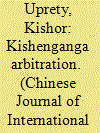

|
|
|
|
|
| Summary/Abstract |
Treaties pertaining to international waters are difficult to implement, often leading to disputes over the unexpected interpretation of their provisions. These disputes generally revolve around the issues of water governance, management and sharing, and environmental concerns, and in many cases, call for the intervention of international tribunals and bodies to resolve them, with the multiple objectives of breaking the tension, appeasing the parties, averting further deterioration of problems, and recommending a mechanism for good-faith implementation of such treaties.
|
|
|
|
|
|
|
|
|
|
|
|
|
|
|
|
| 5 |
ID:
141483
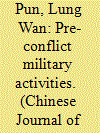

|
|
|
|
|
| Summary/Abstract |
Much study has focussed upon the legality of, as well as justifications for, military activities of States causing environmental damage in times of armed conflict, with particular reference to norms of international humanitarian law. However, in preparation for potential armed conflict, such military activities may also take place before the commencement of any such armed conflict. This paper seeks to explore the environmental protection obligations of States under international law in their conduct of military activities in anticipation of armed conflict. On the one hand, peacetime obligations entailing environmental protection, which may be derived not only from international environmental law but also other fields such as international human rights law and international investment law, would generally apply during the pre-conflict stage. On the other hand, it is also observed that there may be legal justifications for deviation from such obligations in particular circumstances in connection with the pre-conflict situation, for instance, by reliance upon exception clauses within the relevant treaties, suspension of primary obligations due to circumstances such as the needs of national security, as well as invocation of circumstances precluding wrongfulness under the law of State responsibility.
|
|
|
|
|
|
|
|
|
|
|
|
|
|
|
|
| 6 |
ID:
141486
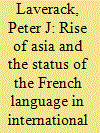

|
|
|
|
|
| Summary/Abstract |
In the last century, French and English became entrenched as the two working languages of international law. Since that time, we have witnessed the rapid development and integration of Asian nations into international systems and the adoption of English as the sole universal language in other fields. This article carries out a cost-benefit analysis concerning the continued use of French in international law, in particular at the tribunals of international criminal law. The aim of this article is to assess whether the current bilingual system is fit for purpose in the 21st century. The mode of analysis is data, first showing the global use of languages today, and then regarding the make-up and workings of international courts, in particular the International Criminal Court. From this data, the author concludes that French is unfit for purpose as a common working language due to the bias that its use creates against Asian and Latin American nations. The author concludes that the only satisfactory solution is the abandonment of French in favour of a system that uses English as the sole common working language.
|
|
|
|
|
|
|
|
|
|
|
|
|
|
|
|
| 7 |
ID:
141481
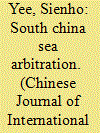

|
|
|
|
|
| Summary/Abstract |
This brief paper comments on the clinical isolation and one-sided tendencies in the Philippines' oral arguments in the South China Sea arbitration, with illustrations from its arguments on (1) negotiation as the agreed exclusive choice for dispute settlement, (2) sovereignty matters, (3) the optional exception of delimitation-related disputes; (4) the optional exception of military activities disputes; and (5) environmental claims.
|
|
|
|
|
|
|
|
|
|
|
|
|
|
|
|
|
|
|
|
|